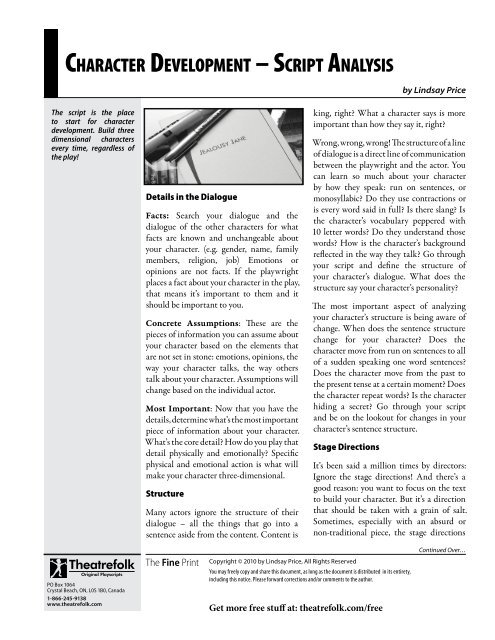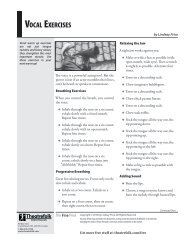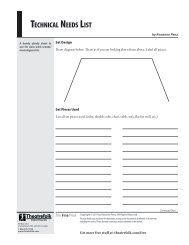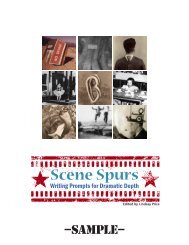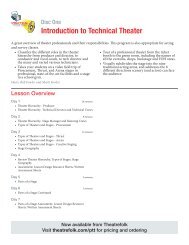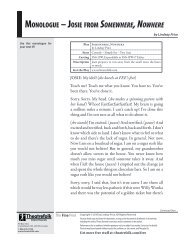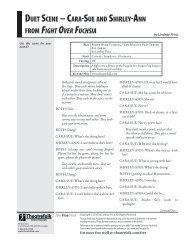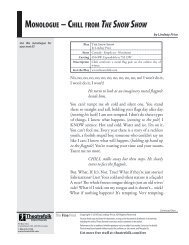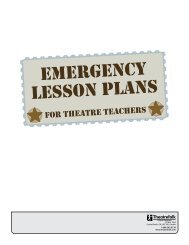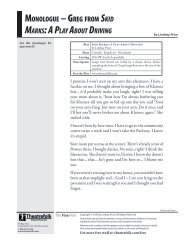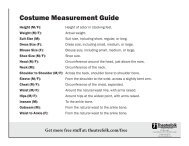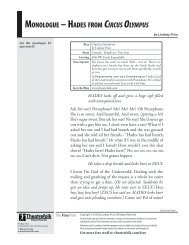CHARACTER DEVELOPMENT – SCRIPT ANALYSIS - Theatrefolk
CHARACTER DEVELOPMENT – SCRIPT ANALYSIS - Theatrefolk
CHARACTER DEVELOPMENT – SCRIPT ANALYSIS - Theatrefolk
You also want an ePaper? Increase the reach of your titles
YUMPU automatically turns print PDFs into web optimized ePapers that Google loves.
Ch a r a C t e r De v elo pm ent <strong>–</strong> SC r i p t an a ly S i S<br />
The script is the place<br />
to start for character<br />
development. Build three<br />
dimensional characters<br />
every time, regardless of<br />
the play!<br />
<strong>Theatrefolk</strong><br />
Original Playscripts<br />
PO Box 1064<br />
Crystal Beach, ON, L0S 1B0, Canada<br />
1-866-245-9138<br />
www.theatrefolk.com<br />
Details in the Dialogue<br />
Facts: Search your dialogue and the<br />
dialogue of the other characters for what<br />
facts are known and unchangeable about<br />
your character. (e.g. gender, name, family<br />
members, religion, job) Emotions or<br />
opinions are not facts. If the playwright<br />
places a fact about your character in the play,<br />
that means it’s important to them and it<br />
should be important to you.<br />
Concrete Assumptions: These are the<br />
pieces of information you can assume about<br />
your character based on the elements that<br />
are not set in stone: emotions, opinions, the<br />
way your character talks, the way others<br />
talk about your character. Assumptions will<br />
change based on the individual actor.<br />
Most Important: Now that you have the<br />
details, determine what’s the most important<br />
piece of information about your character.<br />
What’s the core detail? How do you play that<br />
detail physically and emotionally? Specific<br />
physical and emotional action is what will<br />
make your character three-dimensional.<br />
Structure<br />
Many actors ignore the structure of their<br />
dialogue <strong>–</strong> all the things that go into a<br />
sentence aside from the content. Content is<br />
The Fine Print Copyright © 2010 by Lindsay Price, All Rights Reserved<br />
You may freely copy and share this document, as long as the document is distributed in its entirety,<br />
including this notice. Please forward corrections and/or comments to the author.<br />
Get more free stuff at: theatrefolk.com/free<br />
by Lindsay Price<br />
king, right? What a character says is more<br />
important than how they say it, right?<br />
Wrong, wrong, wrong! The structure of a line<br />
of dialogue is a direct line of communication<br />
between the playwright and the actor. You<br />
can learn so much about your character<br />
by how they speak: run on sentences, or<br />
monosyllabic? Do they use contractions or<br />
is every word said in full? Is there slang? Is<br />
the character’s vocabulary peppered with<br />
10 letter words? Do they understand those<br />
words? How is the character’s background<br />
reflected in the way they talk? Go through<br />
your script and define the structure of<br />
your character’s dialogue. What does the<br />
structure say your character’s personality?<br />
The most important aspect of analyzing<br />
your character’s structure is being aware of<br />
change. When does the sentence structure<br />
change for your character? Does the<br />
character move from run on sentences to all<br />
of a sudden speaking one word sentences?<br />
Does the character move from the past to<br />
the present tense at a certain moment? Does<br />
the character repeat words? Is the character<br />
hiding a secret? Go through your script<br />
and be on the lookout for changes in your<br />
character’s sentence structure.<br />
Stage Directions<br />
It’s been said a million times by directors:<br />
Ignore the stage directions! And there’s a<br />
good reason: you want to focus on the text<br />
to build your character. But it’s a direction<br />
that should be taken with a grain of salt.<br />
Sometimes, especially with an absurd or<br />
non-traditional piece, the stage directions<br />
Continued Over…
are the only place a playwright can pass<br />
on important character information. Keep<br />
that in mind when you are gathering details<br />
on your character.<br />
Character Profile<br />
What do you do when, especially with an<br />
absurd or non-traditional piece, there isn’t<br />
a lot of information in the dialogue for<br />
character-building? What if your character<br />
doesn’t have a name, or repeats the same<br />
word or phrase over and over or is symbolic?<br />
How do you build a three-dimensional<br />
character in that situation?<br />
Fill in the blanks. It’s your job as an actor<br />
to fill in the missing pieces of information<br />
so that your character is as vivid as possible.<br />
Don’t use the excuse: ‘the playwright didn’t<br />
tell me so I don’t have to do anything.’ That’s<br />
the quickest way to presenting a cardboard<br />
cutout of a character.<br />
When you don’t have the details, create a<br />
character profile.<br />
Name <strong>–</strong> Even if your character doesn’t have<br />
a real world name, think of one that would<br />
suit the actions of the character <strong>–</strong> everyone<br />
knows what a Brittany or a Tiffany type<br />
character is, right? Naming your character<br />
will make them more solid.<br />
Age <strong>–</strong> Be specific. A 13-year-old behaves<br />
differently than a 19-year-old.<br />
Family <strong>–</strong> Who makes up their family? If<br />
the character is alone, why? What happened<br />
to the family? Be specific.<br />
Living Arrangements <strong>–</strong> Determine<br />
where your character lives and how they<br />
live. The ‘how’ is important: are they messy,<br />
a neat freak, do they have to share a space<br />
with a dozen others, are they homeless? All<br />
these details add flesh and bone to your<br />
character.<br />
Fear/Secret <strong>–</strong> Give your character a fear<br />
and a secret. Neither of these have to be<br />
tragic or over-dramatic. Human beings are<br />
made up of the small details.<br />
A dream job <strong>–</strong> What would be this<br />
character’s dream job? What’s stopping<br />
them from getting it?<br />
Favourite Memory/Least Favourite<br />
memory/Childhood memory <strong>–</strong> we all<br />
carry around memories. Some of us are<br />
frozen from changing or moving forward<br />
with life because of a specific memory. ❧


